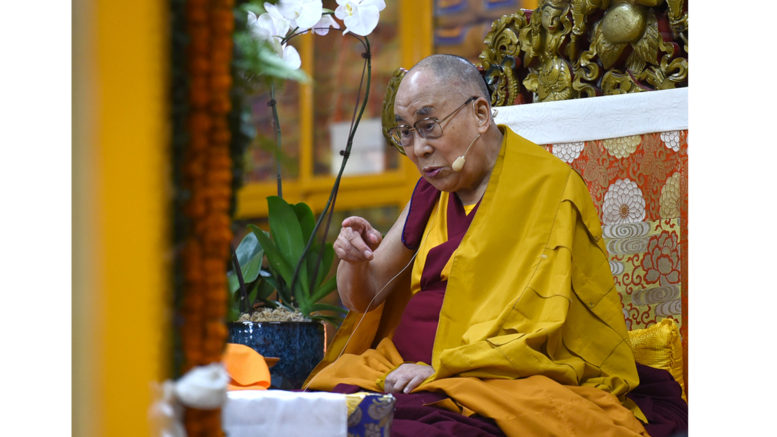Dharamsala: Tibetan spiritual leader, His Holiness the Dalai Lama began four-day Buddhist discourse on Buddhapalita’s Commentary on the Fundamental Wisdom of the Middle Way (drel-pa Buddhapalita) on Tuesday.
The text is an explanatory commentary on Nagarjuna’s ‘Fundamental Wisdom of the Middle Way’ ‘Uma Tsawa Sherab’ (In Tibetan) by Buddhapalita, a student of Nagarjuna.
More than 6000 devotees, not just from Dharamsala but from across India and 70 odd countries converged at Tsuglagkhang to attend the discourse by the revered leader.
“As Buddhist practitioners, we pray that sentient beings experience no suffering, yet the only beings we can really help directly are the human beings with whom we share this earth. We can only pray for beings in other galaxies and can do little to help the animals, insects and fish around us achieve liberation,” His Holiness said in his introductory teachings.
He noted how world has achieved great heights in material progress but the same has not helped reduce human suffering.
”We seek happiness in external things without realizing that they don’t help when we have problems from within. We need to focus instead on the joy that comes with peace of mind that allows us to remain happy in every situation”.
“The roots of happiness lies in the practice of love and compassion and are not determined by wealth or physical nourishment,” he said affirmably.
However, he stated, scientists have recently found evidence that asserts that basic human nature is compassionate and found constant anger, fear and anxiety harmful for our immune system.
“This innate nature is most present during our prime years when we survived due to mother’s love and kindness. Right from the beginning of our lives the love and affection we received from her empowered us to feel calm and secure.
“The sense of love and compassion we have as a result can be strengthened and developed by training and awareness,” he advised the practitioners.
Lending his views on religious understanding, His Holiness explained that all religious traditions espouse love and compassion and are beneficial to their followers in their own way.
He offered India as a shining example. “Here in India over the last 3000 years, religious traditions have emerged that promote love, compassion, self-discipline and tolerance. They adopt different philosophical positions because people have different dispositions.”
He said Buddhism, in particular, has originated in India. The Sanskrit tradition which took its roots in universities of Takshashila, Nalanda and Vikramashila later spread to China and from there to Korea, Japan and Vietnam. The Chinese Buddhist tradition had adopted Nagarjuna’s ideas, but not the system of logic and reason that supported them.
“The Nalanda Buddhist tradition was established in Tibetan in the 8th century when the great scholar, logician and philosopher, Shantarakshita came to Tibet at the invitation of Tibetan Dharma King, Trisong Detsen.
“From Tibet, this approach to study and training spread to Mongolia and the Mongolian Russian Republics,” he said.
His Holiness will continue the teaching of the text tomorrow. The teachings will conclude on 7 September.

His Holiness the Dalai Lama greeting the devotees on the first day of his teachings on Buddhapalita’s Commentary on the Fundamental Wisdom of the Middle Way (drel-pa Buddhapalita) at the Main Tibetan Temple in Dharamsala, HP, India on 4 September 2018. Photo/Tenzin Choejor/OHHDL

